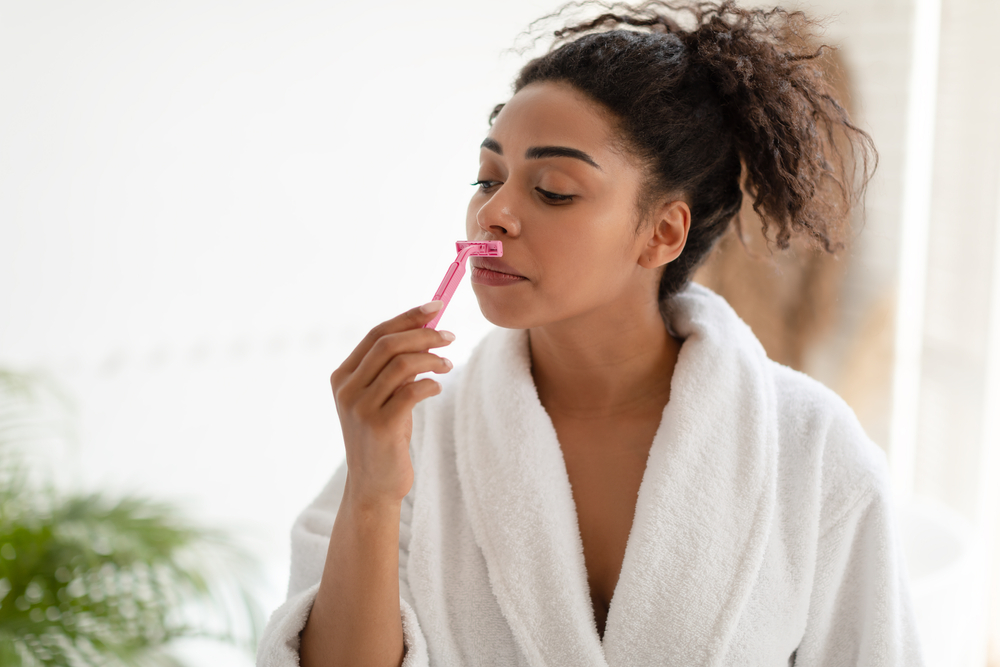As women age, many experience the surprising and sometimes unsettling growth of facial hair, including mustaches. This phenomenon, while common, can lead to questions about its causes and how to manage it. Understanding the underlying reasons for this change is the first step toward addressing it effectively and feeling more confident.
The biological basis of facial hair growth
Hormonal changes
One of the primary reasons women develop facial hair as they age is due to hormonal changes. As women approach menopause, the body’s production of estrogen decreases. Estrogen typically balances the levels of androgens (male hormones) in the body. With the decline of estrogen, androgens become more prominent, leading to the growth of facial hair. Testosterone, a key androgen, stimulates hair follicles — particularly those on the face.
Genetics
Genetics also play a significant role in the development of facial hair in women. If a woman’s mother, grandmother or other female relatives experienced similar hair growth, she is more likely to experience it as well. This hereditary factor influences how sensitive hair follicles are to androgens.
Health conditions and medications
Polycystic ovary syndrome (PCOS)
Polycystic ovary syndrome (PCOS) is a common condition that affects hormone levels in women, leading to various symptoms including excessive facial hair growth. Women with PCOS have higher levels of androgens, which can cause hair to grow on the face, chest and back. Alongside facial hair, PCOS can also cause irregular menstrual cycles, acne and weight gain.
Medications
Certain medications can also contribute to facial hair growth in women. For example, some treatments for epilepsy and certain types of hormonal therapies can increase androgen levels, leading to unwanted hair growth. It’s important to review any medication side effects with a health care provider if facial hair growth becomes a concern.
Managing facial hair growth
Hair removal techniques
There are several methods available for removing unwanted facial hair, ranging from temporary to permanent solutions.
- Shaving: A quick and easy method, but hair tends to grow back quickly.
- Waxing and sugaring: These methods remove hair from the root, leading to longer-lasting results, though they can be painful.
- Plucking: Effective for small areas, but can be time-consuming and painful.
- Depilatory creams: These creams dissolve hair but can sometimes cause skin irritation.
Permanent solutions
For those seeking a more permanent solution, options include:
- Laser hair removal: Uses laser light to target and destroy hair follicles, reducing hair growth over time. Multiple sessions are typically needed.
- Electrolysis: Involves inserting a fine needle into the hair follicle and applying an electric current to destroy the follicle. This method is effective but can be time-consuming and costly.
Prescription treatments
For women experiencing significant facial hair growth due to hormonal imbalances, prescription treatments may be necessary. Medications such as oral contraceptives can help balance hormone levels, while anti-androgen medications can reduce the effects of androgens on hair follicles.
Embracing natural changes
While managing unwanted facial hair is important for many women, it’s equally crucial to embrace the natural changes that come with aging. Societal standards often put undue pressure on women to conform to certain beauty norms, but recognizing that facial hair growth is a common and natural part of aging can help in building self-acceptance.
Self-care and confidence
Maintaining self-care routines and focusing on overall well-being can boost confidence. Engaging in activities that promote self-esteem — such as exercise, hobbies and social connections — can help mitigate the emotional impact of physical changes.
Understanding and dealing with facial hair
The growth of facial hair — including mustaches — in women as they age is a multifaceted issue primarily driven by hormonal changes, genetics and health conditions like PCOS. While various methods exist for managing this hair growth, from temporary removal techniques to permanent solutions, it is also important to foster a sense of self-acceptance and confidence. Understanding the reasons behind this natural change can empower women to make informed decisions about their health and well-being, ultimately embracing the aging process with grace and confidence.
This story was created using AI technology.
















